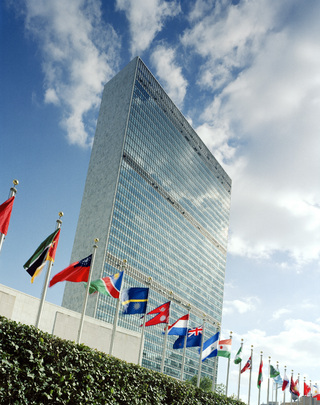It deserves criticism for its failures and faults, but should the UN be crucified, and most frequently for conflicts and problems that Washington and the "Big Powers" are unable or unwilling to adequately address? What then may be more surprising is how many in the U.S. want to wash their hands of the UN as well as presumably the intractable conflicts. Perhaps though it is just the UN again being a convenient scapegoat and/or route for avoiding responsibility? Another replay of Pontius Pilate? While many complain of the failures and more frequently of the unseemly regimes represented at the UN, the biggest beneficiary diplomatically and economically may be the U.S. as global power and headquarters home for the UN.
Criticism or Crucification?
Whether one perceives the U.S. as a force for good or imperial power, the UN's agenda is inevitably shaped by its veto-wielding powers, either by action or inaction. The UN is frequently injected into issues that serve the interests of its most powerful members, the "P-5," (China, France, Russia, U.K. and the U.S.) Less obvious is when the UN is delivered conflicts/problems that Washington and the P-5 cannot or are more likely unwilling to address -- see Bosnia, DRC (Congo) and Syria as three more recent examples. A critical review of the UN should be welcome, including costs and benefits, but also as to the role of its most powerful members in addressing the globe's most urgent conflicts and chronic challenges and the consequent failures.

UN May Be Only Option in Sanctions for North Korea Nuclear Program:
The choice of which conflict Washington opts to engage in directly is largely based on perceived U.S. interests. Those that either are deemed not of adequate strategic/economic/political interest or which do not hold the requisite promise of rapid victory are dropped upon the UN. Interests and resources are prioritized in part via Washington's decisive role at the UN. It is broadly agreed that the U.S. sitting on top of the global pyramid has the most to benefit in maintaining the current global hierarchy and decisive control of the UN's agenda. UN diplomatic/peacekeeping military interjection, even if rather feeble, may be a relatively cost effective (in economic, political and real life currency) substitute for U.S. action. Similarly, it could also directly augment Washington's own less than effective options in acting directly and/or unilaterally. The latest example is North Korea's very active nuclear program. The U.S. has few options to act unilaterally in view of China's geographic proximity and long-standing support for North Korea. Nonetheless, the U.S. has managed to engage Beijing via the UN Security Council to tighten sanctions, the only tool/weapon effectively available to Washington.
UN as Threat to U.S. Sovereignty?
So why do so many in the U.S. opt to bash the UN, deserved or not? It is more than just about effectiveness. Some have painted the UN as seeking to embezzle U.S. sovereignty. The U.S. Senate recently failed to adopt a global compact on Persons with Disabilities despite that fact that it was largely modeled on already adopted U.S. Congressional legislation and was supported by a cross-section of U.S. veterans' groups and GOP leaders as former senator/Republican candidate Bob Dole and current Senator John McCain. The treaty failed to achieve the necessary supra majority needed for ratification largely due to a Republican minority which exploits the antipathy toward the UN in ideological or even theological terms.
The U.S. has recently opted ever more to remain outside/beyond important advances, from treaties to the International Criminal Court. Yes, in part such engagements may constrain unilateral expressions of sovereignty, but then can the U.S. expect others to act responsibly? The U.S. has led the globe with its values of open society and democracy, but for how long can U.S. maintain if preaching the rule of law but opting out of the International Criminal Court? Military and economic power is limited in its efficiency and ultimate success.
The Anti-Christ??
However, what appears to feed most severely the popular antipathy toward the UN, at least among a substantial minority of religious extremists, is the belief, "prophecy," that it will be the base for the new Anti-Christ and thus also the "end of days." A whole popular culture industry of books and films feeding the Christian right incorporates the thesis that a charismatic UN Secretary General will be revealed to be the Anti-Christ. (This is a bit ironic in view that the current UNSG Ban Ki-moon and his wife are devout Evangelical Christians.) Nonetheless, a recent swell of U.S. politicians who appeal to the current right in the U.S. have exploited this tide linked with xenophobia to clamor against the United Nations both as institution and foundation for U.S. cooperation with the rest of the globe. Like so many other things foreign, the UN has become a favorite target for suspicion that views it as heretical and antagonistic to U.S. values as well as interests.
Part 1 of 2 - Next - How UN actually furthers US economic interests.
@MuhamedSacirbey
UN Photo / Andrea Brizzi
